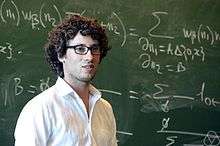Hugo Duminil-Copin
Hugo Duminil-Copin (born 26 August 1985) is a French mathematician, specialised in probability theory.
Hugo Duminil-Copin | |
|---|---|
 Hugo Duminil-Copin, 2014 | |
| Born | 26 August 1985 |
| Nationality | French |
| Alma mater | Lycée Louis-le-Grand École normale supérieure University of Paris-Sud |
| Awards | Rollo Davidson Prize (2012) Oberwolfach Prize (2013) EMS Prize (2016) |
| Scientific career | |
| Fields | Mathematics |
| Institutions | University of Geneva Institut des Hautes Études Scientifiques |
| Doctoral advisor | Stanislav Smirnov |
Biography
Hugo Duminil-Copin studied at the Lycée Louis-le-Grand in Paris, then the University Paris-Sud and the École normale supérieure (Paris). In 2008, he moved to the University of Geneva to write a PhD thesis under Stanislav Smirnov. In 2013, after his postdoctorate, he was appointed assistant professor, then professor, at the University of Geneva. In 2016, he became permanent professor at the Institut des Hautes Études Scientifiques.[1]
Awards
- 2018 Invited speaker (session Probability and session Mathematical Physics) at the International Congress of Mathematicians of Rio de Janeiro
- 2017 Loève Prize
- 2017 Jacques Herbrand Prize
- 2017 New Horizons Prize in Mathematics
- 2016 Prize of the European Mathematical Society
- 2015 Early Career Award of the International Association of Mathematical Physics
- 2015 Peccot Lecture at the Collège de France[2]
- 2013 Oberwolfach Prize
- 2012 Prix Rollo Davidson (with Vincent Beffara)
- 2012 Prix Vacheron-Constantin Prize[3]
Selected publications
- Graphical Representations of Lattice Spin Models (Cours Peccot 2015), Paris, Spartacus IDH, ISBN 978-2-36693-022-1.
gollark: I've moved the `getTime` call around a bit but I don't *think* that is the cause of anything.
gollark: This should only happen if the rolling successful ping counter and rolling total ping counter are somehow substantially out of sync, and I have no clue how that could possibly happen.
gollark: Wow, this issue actually makes no sense.
gollark: (they're only a performance optimization)
gollark: There are some SQL commands you should be able to run to make it recompute the rolling counters from historical request data.
References
External links
This article is issued from Wikipedia. The text is licensed under Creative Commons - Attribution - Sharealike. Additional terms may apply for the media files.